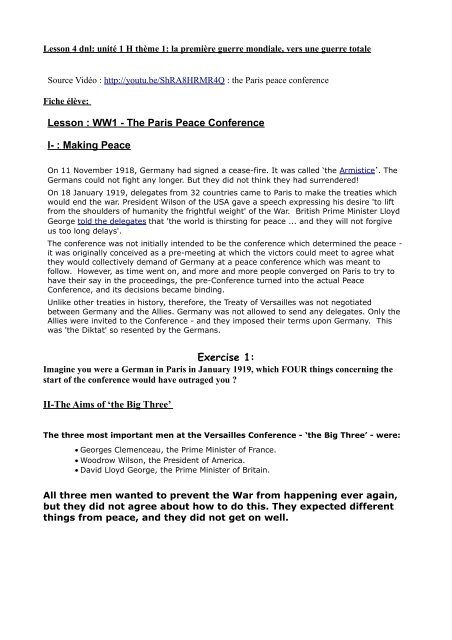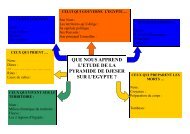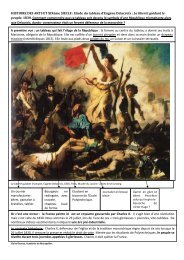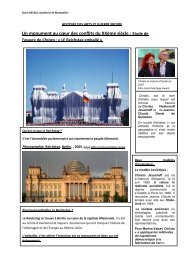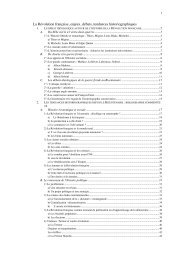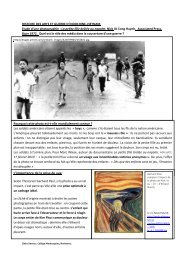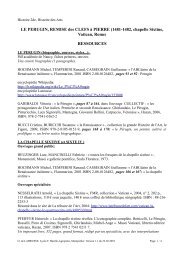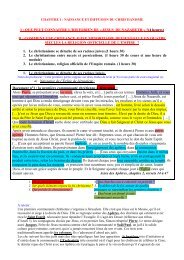Lesson : WW1 - The Paris Peace Conference I- : Making Peace ...
Lesson : WW1 - The Paris Peace Conference I- : Making Peace ...
Lesson : WW1 - The Paris Peace Conference I- : Making Peace ...
Create successful ePaper yourself
Turn your PDF publications into a flip-book with our unique Google optimized e-Paper software.
<strong>Lesson</strong> 4 dnl: unité 1 H thème 1: la première guerre mondiale, vers une guerre totale<br />
Source Vidéo : http://youtu.be/ShRA8HRMR4Q : the <strong>Paris</strong> peace conference<br />
Fiche élève:<br />
<strong>Lesson</strong> : <strong>WW1</strong> - <strong>The</strong> <strong>Paris</strong> <strong>Peace</strong> <strong>Conference</strong><br />
I- : <strong>Making</strong> <strong>Peace</strong><br />
On 11 November 1918, Germany had signed a cease-fire. It was called ‘the Armistice’. <strong>The</strong><br />
Germans could not fight any longer. But they did not think they had surrendered!<br />
On 18 January 1919, delegates from 32 countries came to <strong>Paris</strong> to make the treaties which<br />
would end the war. President Wilson of the USA gave a speech expressing his desire 'to lift<br />
from the shoulders of humanity the frightful weight' of the War. British Prime Minister Lloyd<br />
George told the delegates that 'the world is thirsting for peace ... and they will not forgive<br />
us too long delays'.<br />
<strong>The</strong> conference was not initially intended to be the conference which determined the peace -<br />
it was originally conceived as a pre-meeting at which the victors could meet to agree what<br />
they would collectively demand of Germany at a peace conference which was meant to<br />
follow. However, as time went on, and more and more people converged on <strong>Paris</strong> to try to<br />
have their say in the proceedings, the pre-<strong>Conference</strong> turned into the actual <strong>Peace</strong><br />
<strong>Conference</strong>, and its decisions became binding.<br />
Unlike other treaties in history, therefore, the Treaty of Versailles was not negotiated<br />
between Germany and the Allies. Germany was not allowed to send any delegates. Only the<br />
Allies were invited to the <strong>Conference</strong> - and they imposed their terms upon Germany. This<br />
was 'the Diktat' so resented by the Germans.<br />
Exercise 1:<br />
Imagine you were a German in <strong>Paris</strong> in January 1919, which FOUR things concerning the<br />
start of the conference would have outraged you ?<br />
II-<strong>The</strong> Aims of ‘the Big Three’<br />
<strong>The</strong> three most important men at the Versailles <strong>Conference</strong> - ‘the Big Three’ - were:<br />
• Georges Clemenceau, the Prime Minister of France.<br />
• Woodrow Wilson, the President of America.<br />
• David Lloyd George, the Prime Minister of Britain.<br />
All three men wanted to prevent the War from happening ever again,<br />
but they did not agree about how to do this. <strong>The</strong>y expected different<br />
things from peace, and they did not get on well.
Exercise 2 : Complete the missing words :<br />
Georges Clemenceau<br />
He was the ………………………………………………….. of France.<br />
He wanted …………………………………, and to ………………………………….. the Germans for what they<br />
had done.<br />
He wanted to ………………………………………………….for the damage done during the war.<br />
He also wanted to weaken Germany, so France would never be ……………………………….. again.<br />
Woodrow Wilson<br />
He was ……………………………………. America.<br />
He was a History professor. He wanted to make the world …………………..He wanted<br />
to end war by making a ………………… peace.<br />
In 1918, Wilson published ‘………………………………………’ saying what he wanted.<br />
He said that he wanted disarmament, and a ……………………………. of Nations (where<br />
countries could talk out their problems, without war).<br />
He also promised self-determination for the peoples of Eastern Europe.<br />
David Lloyd George<br />
He was ………………………………………… of Great Britain.<br />
He said he would ‘make Germany pay’ – because he knew that was what the British people<br />
wanted to hear.<br />
He wanted ‘justice’, but he did not want ……………………….. He said that the peace must<br />
not be ………………………….. – that would just cause another ……………. in a few years<br />
time.He tried to get a ‘halfway point’ – a compromise between Wilson and Clemenceau.<br />
He ALSO wanted to expand the British Empire, maintain British control of the seas, and<br />
increase Britain's trade<br />
III- the main points of the treaty : (Summary)<br />
On 28 June 1919, the Treaty of Versailles was signed with Germany. <strong>The</strong> Germans had not been allowed to send any<br />
delegates, and had to accept whatever was decided. <strong>The</strong> Treaty had five main points:<br />
By Clause 231, Germany had to accept the blame for starting the war.<br />
Germany’s military power was reduced.Germany was not allowed to have submarines or an air force. It could have an<br />
army of only 100,000 men and a navy of only 6 ships, and it was not allowed to place any troops in the Rhineland.<br />
Germany had to pay £6,600 million ‘reparations’ for damage done.<br />
Germany lost land. <strong>The</strong> Saar coalfield was given to France for 15 years, and Alsace-Lorraine given back to France.<br />
Danzig became a free city, and Poland was given a ‘corridor’ to the Baltic Sea. Germany was not allowed to unite with<br />
Austria. Finally, Germany’s colonies were given to France or Britain.<br />
Germany was not allowed to join the League of Nations.
Fiche professeur:<br />
Video :<br />
FROM THE BEGINNIG TO 1mn20<br />
End of the war<br />
Armistice was signed / joy /Destructions /deaths- to pay the price of peace<br />
Here in Versailles that the peace was signed<br />
First Task :<br />
1- Germany had signed a cease-fire, it wasn’t a surrender<br />
2- <strong>The</strong> peace conference became the actual peace conference. Its decisions<br />
became binding ( voc)<br />
3- <strong>The</strong>re had been no negotiation between Germany and the allies<br />
4- Germany was not allowed to send any delegates<br />
5- <strong>The</strong> allies imposed their terms upon Germany<br />
Video :<br />
From 1,20 mn to 2,55 mn :<br />
<strong>The</strong> big three :Pt Wilson, Clemenceau and Georges<br />
Clemenceau : revenge, reparations for the damages, garantees that the War could never happen<br />
again<br />
Video from 2,55 mn to 3,45 mn<br />
Wilson : a just and lasting peace - not punishment - 14 points for the peace - no more secret<br />
diplomacy - reduction in armements - A league of nations to protect all the countries from<br />
aggression<br />
Video : from 3,45m n to 4,31 mn<br />
Lloyd George : didn’t want to destroy Germany - Germany should become strong, a trade patner,<br />
He wanted to avoid thousands of refugees because of poverty, starvation…because of communism..<br />
Exercise 2 : Complete the missing words<br />
Video : from 5,34mn to the end<br />
After three months of discussion, they presented the terms of the treaty to the Germans<br />
Germany lost land in the East, West and the North -In the East, a corridor to the Baltic was given to<br />
the Poland, separating the East Prussia from the rest of Germany -On the West, France took back<br />
Alsace and Lorraine -Sarre under control of SDN -Coalfields given to France for 15 years<br />
Rhineland occupied by allies -Army reduced, no air force, no submarines -A compromise, no one<br />
was comptletely satisfied<br />
Annabel Guyon Collège F,Bazille – Castelnau le Lez


